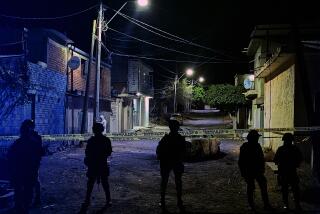Pentagon Labels Hussein a POW, Conferring Him Special Rights
Pentagon lawyers have determined that Saddam Hussein is a prisoner of war, a Defense Department spokesman said Friday, entitling the former Iraqi president to refuse interrogation and possibly complicating the Bush administration’s plan to let Iraqis prosecute him.
The much-anticipated decision means that Hussein, captured Dec. 13, will be accorded certain rights under the Geneva Convention. The status bars the U.S.-led coalition in Iraq from using coercion during questioning and allows Hussein to wear a military uniform and receive Red Cross visits and care packages, international law experts said.
“This conflict was governed by the Geneva Conventions, and he is clearly an enemy prisoner of war,” senior Pentagon spokesman Lawrence Di Rita said of Hussein. “He’s an enemy prisoner of war until it’s determined otherwise.
“Saddam’s ultimate disposition is still something to be determined,” he said.
To overturn the decision, the Bush administration would have to find a legal argument for the change. Defense Secretary Donald H. Rumsfeld has repeatedly said Hussein’s status would be decided by Pentagon lawyers.
It was unknown whether other captured military officers would be accorded prisoner of war status.
Some specialists in international law questioned why the action took so long.
“Frankly, I think this confusion was allowed in order to enlarge the field of interrogation,” permitting tactics that might be seen as violations of international law if used on a POW, said Eugene Fidell, president of the National Institute of Military Justice, a nonpartisan lawyers group that monitors the military-justice system. “This is not the type of decision that takes two or three weeks to make.”
The decision left a number of questions unanswered, including where and how Hussein could be tried. Prisoners of war are entitled to be tried for war crimes by a military tribunal established by the occupying power. Administration officials have said they want Iraq’s embryonic justice system to deal with the former dictator.
Panamanian leader Manuel Noriega was treated as a POW when he was captured in a military action. He was tried in a U.S. District Court and convicted in 1992 for drug crimes rather than crimes of war. Military trials for war crimes are subject to appeal within the U.S. justice system, ultimately extending to the Supreme Court, legal experts said.
“The administration owes everyone concerned -- both here and in Iraq -- a reasoned explanation as to the implications of this,” Fidell said. “And if the implications are as they seem to be, that the U.S. has an obligation to afford him a trial in a military court with the same right to appeal and review that GIs get ... if he’s not going to get that, how come?”
Administration officials have insisted that Hussein’s treatment would not change after the legal determination became clear. Secretary of State Colin L. Powell told CBS News on Friday, “We are certainly treating everybody in our custody in accordance with basic rights and expectations of international agreements that we have.”
His comments echoed those made Tuesday by Rumsfeld, who told reporters that Hussein was being treated “according to the Geneva Conventions.”
Legal experts, however, challenged that view.
“He means Geneva Conventions Lite,” Fidell said.
Under the Geneva Convention, prisoners of war are obligated to provide only their name, rank and serial number when interrogated. They are allowed to wear their military uniform and insignia, be visited by the Red Cross and have packages of food delivered by family members.
The convention bars inhumane methods of questioning POWs, including sleep deprivation and other techniques used to question prisoners such as those at a military prison in Guantanamo Bay, Cuba, whom the administration has declared “unlawful combatants.” That term was used because it denies the detainees the rights accorded under the convention.
Whatever tactics have been used -- U.S. defense officials have not disclosed them -- Hussein has apparently offered little of value during his interrogation, a senior British official told reporters in London.
“He has not talked himself, but the papers found with him led to further information that led to further operations,” the official, speaking on condition of anonymity, told reporters. Thanks to those documents, the official said, “the results of the capture of Saddam were greater than we were ever expecting.”
Hussein has not been wearing the Iraqi army uniform. It remains unclear whether Hussein, who was captured wearing a traditional Muslim tunic, had sought to wear the uniform.
The conventions also bar nations from making POWs a subject of “public curiosity” in photographs or in person.
“If he’s a prisoner of war, they should not have published those photographs of him,” said Detlev Vagts, a professor of international law at Harvard University. “I think this would have been a rather aggravated violation of that.”
The announcement had apparently not been planned for Friday. A Pentagon spokesman, Air Force Maj. Michael Shavers, informed reporters apparently before Rumsfeld or other senior Pentagon officials had a chance to review the lawyers’ decision, defense officials said. After some defense officials denied the decision, Di Rita confirmed it to a small group of reporters late Friday.
“It didn’t come out exactly as we’d wanted it to,” said one official, who requested anonymity.
More to Read
Start your day right
Sign up for Essential California for news, features and recommendations from the L.A. Times and beyond in your inbox six days a week.
You may occasionally receive promotional content from the Los Angeles Times.






